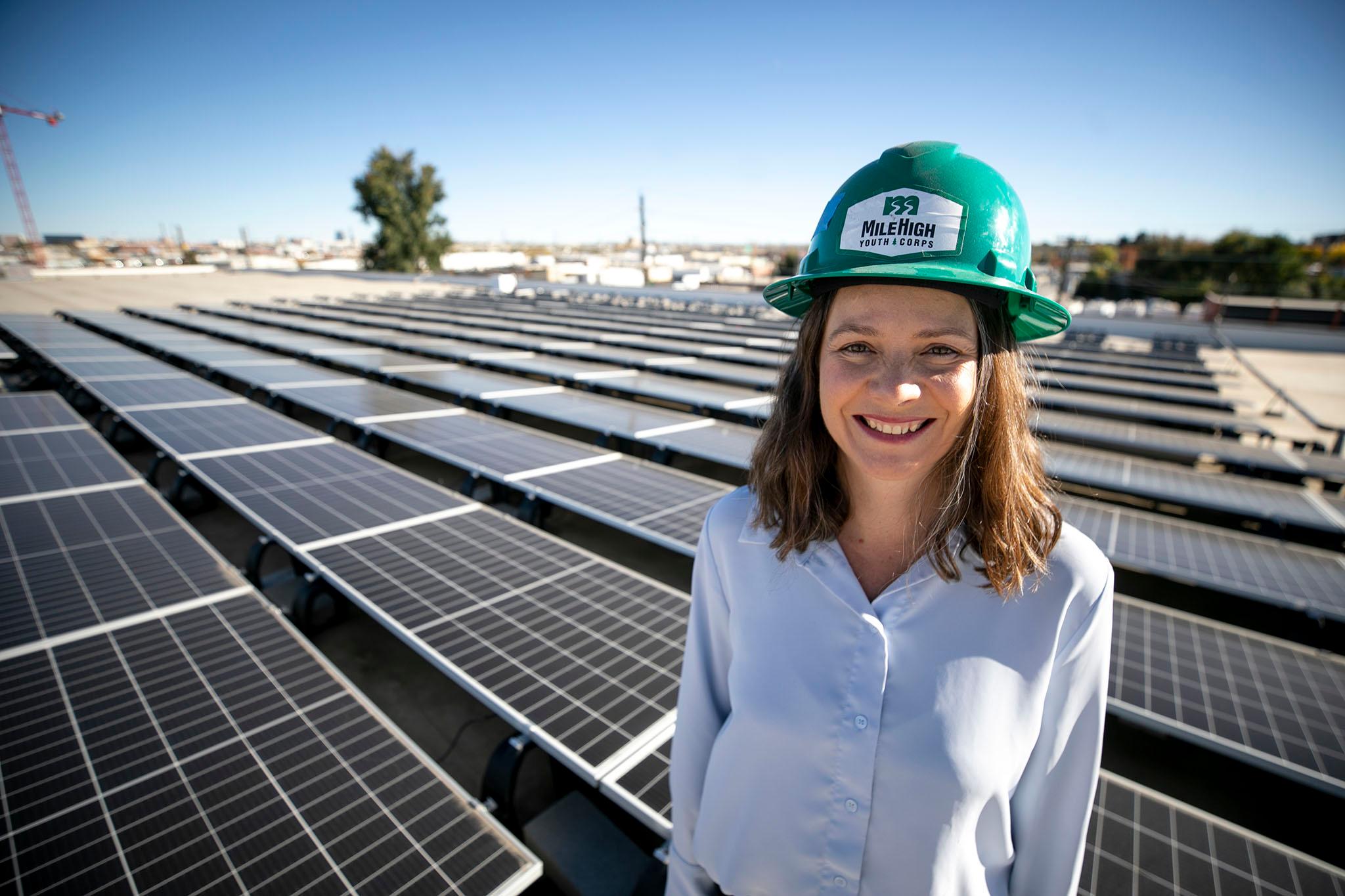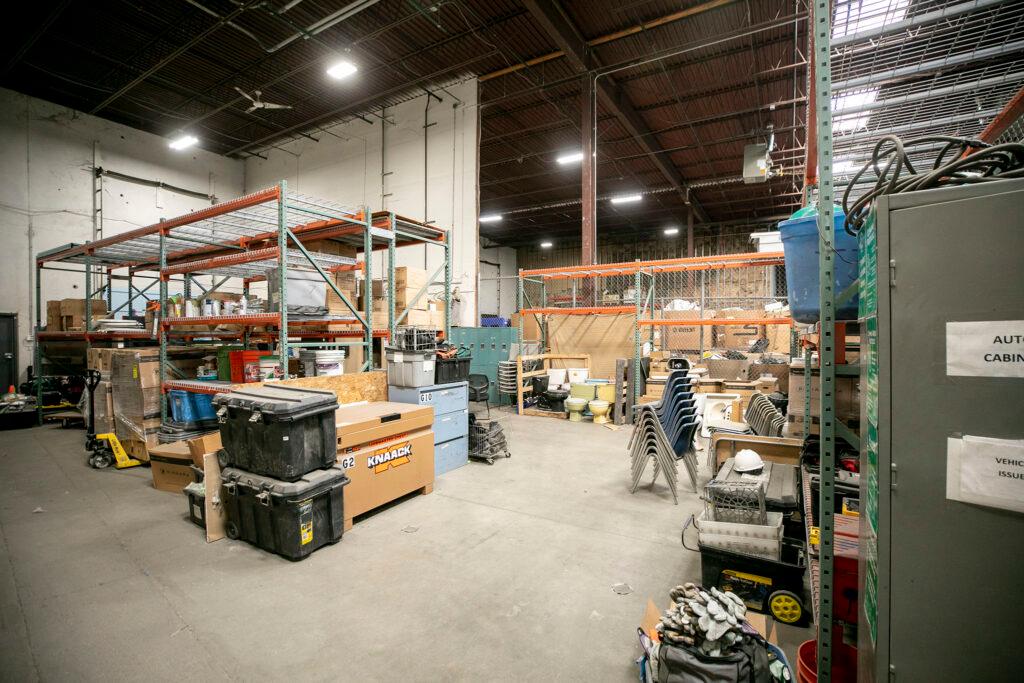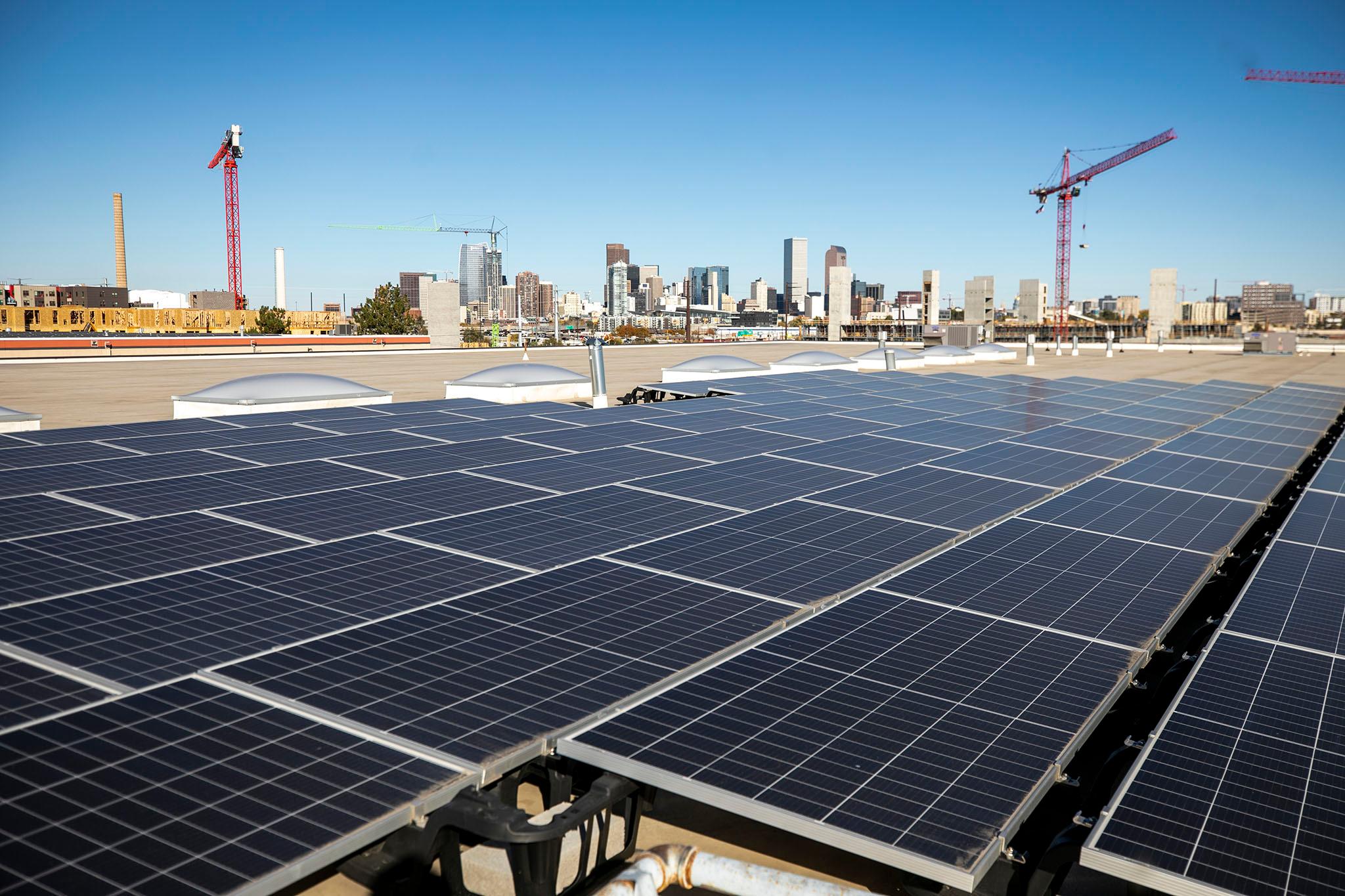
Denver is one of the few U.S. cities with an office dedicated to reducing greenhouse gas emissions and responding to the local effects of climate change.
Denver’s Office of Climate Action, Sustainability & Resiliency was funded through a local sales tax increase that Denver voters passed in 2020.
Three years ago, Liz Babcock helped create the office. Now, Denver Mayor Mike Johnston has appointed her to lead it.
“I think the work of climate action has to engage everyone in our community,” Babcock said in an interview with Colorado Matters. “We are experiencing an affordability crisis in our community, and so pairing climate action and clean energy with programs that actually lower people's energy costs is really important.”
Babcock is the second leader for the climate office after the inaugural director, Grace Rink, left in September to work on decarbonization strategy for an infrastructure consulting firm.
For the last 12 years, Babcock has helped the city and county develop various climate, energy and resiliency programs. Babcock said she plans to use her new authority to carry out climate priorities set by the community.
Colorado Matters host Ryan Warner interviewed Babcock in a warehouse in Sun Valley, which is home to community-based organizations like Blue Star Recyclers and Mile High Youth Corps — and one of the Denver neighborhoods most vulnerable to the effects of warming.
This transcript has been lightly edited for clarity.
Ryan Warner: Denver is projected to experience more extreme heat. This past summer, in fact, broke records. And neighborhoods like this one experience the brunt of it. A lot of that is because of factors that make people who live here less adaptable: lower incomes, more disabilities, more challenges with language, housing, transportation. But also because of things like trees — or the lack thereof. Sun Valley is in the lowest category for tree cover. So, what is your plan for neighborhoods like this?
Liz Babcock: We do know from the data that communities like Sun Valley have some vulnerabilities to climate change. They're more vulnerable to extreme heat, like you said, because of the lower tree canopy, but also because of social and health and demographic factors.
Warner: I just want to point out there's four times more tree cover at the governor's mansion across town, just for perspective.
Babcock: That's right. Sun Valley has the lowest tree canopy in the city, and so what we want to do is really talk to those communities about what things would actually help them be meaningful for them, and we've done that.
Neighborhoods told us they're concerned about air quality, they're concerned about heat, they're concerned about access to transportation. They're also concerned about racism and environmental injustice. They're concerned about safety and they're also worried about job opportunities for youth.
Warner: What did they tell you about air quality and how do you address it?
Babcock: Particularly in North Denver, it's a concern for folks because there are more industrial facilities located there as well as major highways. So they want us to be addressing that through lowering emissions from the major sources of air pollution. The number one source of air pollution in Denver is transportation.
So, what we have to do is both move forward rapidly to electrify all of the vehicles on the road, but we also can't just keep growing the number of vehicles on the road. We really have to provide those choices to people that allow them to safely walk and bike and to take transit. Transit needs to be frequent and affordable and reliable, and so those are the strategies that we want to see move forward rapidly to address emissions from transportation.
Warner: The folks raising concerns about air quality, are they the same people who can afford an electric car?
Babcock: So in those communities, many people are interested in purchasing electric vehicles. For some it may be out of reach. We fund one of the vehicles in the Denver Connector Service, so that's a free micro transit service offered by the city where you can call up and get a free ride. It's available right now in Montbello and in Globeville, and hopefully we'll expand to other parts of the city.
Our office pays for the electric vehicle as part of that service. We also have electric vehicle car share. You can use it for any errands that you might need where other transportation options aren't viable for you, and we subsidize the memberships for that.
Warner: We had a wet spring. Fall is off to a dry start, and these are the conditions that in 2021 helped ignite the Marshall fire in Boulder County. It's a reminder of how vulnerable urban and suburban neighborhoods are to climate fueled wildfires even in the dead of winter. With the idea of resiliency, there are a lot of places in Denver near grasslands. What is your office doing about that?
Warner: So you're doing mapping right now of that?
Babcock: What we've started to do is look at which areas of the city might be more prone potentially to exposure to those wildfires. Like you said, there are some parts of the city that are closer to that short grass prairie and if it ignited, it could create a larger fire that could spread.
We're doing mapping of that and we do have a map of other vulnerabilities as well. So we have a map of heat vulnerability, for example, vulnerability to extreme weather, which is really looking at economic and social factors. If you are uninsured or underinsured, it might be difficult for you as you said, to bounce back from an extreme weather event, whether that's a hailstorm, extreme wind.
There has been some mapping done by the Office of Emergency Management on flooding as well, and as you probably know, there's a large project to look at restoration along the South Platte River and flood mitigation as well. So we have to take each one of those vulnerabilities very seriously and start looking at where in the city we are vulnerable and then what are the policies, programs and infrastructure that's needed to help create a more resilient future for those communities.
Warner: ...and maybe you harness the power of youth to help implement that.
Babcock: That's right. We are working right now with Mile High Youth Corps to help us with a lot of the work that we're doing around making each household more resilient, individually resilient to some of those extreme weather events.
So, you have extreme temperatures if your house is not well insulated, if you have old equipment that is not very efficient. When you have either extreme heat or extreme cold, you're going to be paying a lot more for your utility bills than if you have a really well-insulated home with new equipment that's highly efficient.


Warner: You and I are in this warehouse, we walked past an enormous pallet of roof insulation for this purpose. The city's goal is 100% renewable electricity by 2030. Do you think that goal is reachable?
Babcock: The state of Colorado has required Xcel Energy to get to more than 80% emissions reduction by 2030, so we're already at least 80% of the way there.
Warner: Xcel Energy, the utility for Denver.
Babcock: That's right. And what we're doing to try to fill the gap is building community solar like we have on the roof of this building that we're in today. So we have solar that we are building in schools, rec centers all across the city that help power municipal facilities and lower our energy costs, but we're also donating a portion of that bill credit from that power to income-qualified families.
Warner: That is to say you feed the grid back to some extent in benefit of people who can't afford their electricity bills.
Babcock: That's right. And we also have significant incentives for homeowners to put on rooftop solar as well. And so we think through incentives, through the policy work that we do and through a lot of the infrastructure that we're building through our community solar program, we can close that gap between the 80% that Xcel will get to and the 100% of our goal.
Warner: China permitted the equivalent of about two new coal power plants per week last year. Meanwhile, it's almost a guarantee that 2023 will end as the warmest on record. Does that kind of activity make your job feel good in the face of those powerful trends?
Babcock: Climate solutions are no-regret solutions, so I always feel like what we're doing is worthwhile because it decreases air pollution right here locally in our community. So, regardless of what's happening in other places around the world on climate, what we're doing to bring on renewable energy to be more efficient, transform our transportation system, all of those solutions are health solutions. They're quality of life solutions. They help with affordability.
To me, there are no-regret solutions regardless of what is happening in other places. I do understand that for many people it can feel daunting when you look at the scope and scale of the problem, but I think if we continue to demonstrate leadership, it will help inspire more and more action.
Warner: I almost feel like we got a glimpse into your self-talk, that is when you feel daunted by the world, do you tell yourself, "But I did things today I don't have regrets about."
Babcock: Yeah. This is my mission in life. I was asked at an event recently, "What is the reason why you do this work?" And I want to be able to tell my daughter that I did everything I could to address the climate crisis and I want to do that for all kids.
Warner: When it comes to fighting climate change on an individual level, there are so many trade-offs. Global warming worries me, but I own a combustion-engine car outright. I have to fly to California this month for a funeral even though I know air travel is a biggie in terms of carbon. Are there places like that where your own values run up against the realities of your daily life?
Babcock: I would say that most of what I do in my daily life aligns with my values, but as you pointed out, sometimes there's big expensive changes that might have to happen in our systems to get to the outcomes that we want on climate.
I own a 1927 bungalow that doesn't have any ducting and doing electrification might be challenging for me in the near term, so I'm looking at different ways of how I can finance that? There's going to be more money coming from the IRA and it's going to get even more affordable. For me, I understand some of those challenges and that's why I think our office is really focused on people's experience. I think sometimes people think things are more of a barrier than they are.
People talk a lot about the price of electric vehicles, but they're actually at cost parity now with a traditional internal combustion engine vehicle. We bought a used EV that was our first car and it was very affordable, and you can actually use the state's tax credits towards a used electric vehicle as well.
Warner: You mentioned the IRA; that's the Inflation Reduction Act. Molly Cruse with CPR's Climate team went to a meeting the other day in Kiowa. It was an open house for residents to ask questions about Xcel Energy's massive new transmission line project.
The project will allow for more wind and solar from the plains to connect to the grid. And one thing that Molly heard from folks there was concern that their communities are going to be disrupted, even ruined, to supply energy to folks in Denver. An Elbert County rancher, Brad Ray, says his land is going to be directly affected by transmission lines. What would you say to someone like Brad Ray?
Babcock: I'd say that I understand his concerns, and I think that the reality for us today as a society is that we are going to be facing impacts from climate change, and so we have choices to make and sometimes those choices will be difficult ones. We will need to build more infrastructure to support renewable energy.
I think that communities in Eastern Colorado and all across the country are already being affected by the climate crisis. So, I think that if we are going to be successful in addressing this challenge, we have to figure out ways to work with communities to be able to say, yes. And at the same time here in Denver, what we're trying to do is make sure that we're doing our part so that we can reduce the demand for energy through energy efficiency.
Also building local — so we're doing a lot of local solar. I think it is our responsibility to do everything that we can as a community to make sure that we're reducing any impacts of our energy footprint and at the same time we know that it's essential to make this transition happen.
Warner: This is fascinating to me. In other words, if Denver reaches 100% renewable electricity, you don't then think, "leave the lights on kids. It's fine." You think that even at that point, we still have to be smart about use?
Babcock: I think that's right because we are needing to invest a lot of money in infrastructure to make sure that we're rapidly doing the clean energy transition that we need and the more efficient we can be, the less we'll have to spend on that new infrastructure and the more we can reinvest that in other areas of infrastructure, whether that's resilience to flooding or other infrastructure projects that we need.
Warner: Is part of your message to Brad Ray, "Yes, there are sacrifices coming, but they're probably not as great as the sacrifices as you might make if climate change becomes even worse?" Do I hear you saying that?
Babcock: The cost of doing nothing is much greater than the cost of moving forward with the energy transition.
Warner: Denver's e-bike program is a smash hit. There are pretty strong signals it's one of the most successful programs like it anywhere. Does that surprise you?
Babcock: I think we are all a bit surprised, but I think it makes a lot of sense at the same time, everything aligned. People were already starting to be interested in e-bikes when we launched the program, but then we saw a huge spike in gas prices that summer, and there had only been maybe one or two other programs nationally that had existed before ours.
We were caught a little bit off guard … but if you really look at what people are trying to do, people want to be out in the community experiencing their neighborhoods, having fun, talking with their neighbors, being able to explore the city free from a car, and e-bikes are just a joy to ride. I've had an e-bike, I got mine back in 2018. I've had it for a long time, and I remember the first time I took my daughter on it and she was sitting in the back in a little kid's seat and she just giggled and laughed and thought it was the best thing ever.
Warner: Do you think that there is any sense given the e-bike program's success that it will siphon from other projects?
Babcock: That's a great question. We definitely try to be responsive to what the community wants, and at the same time we are also balancing that with the key outcomes from the fund, which is to eliminate greenhouse gas emissions and air pollution.
I will say the e-bike program is one of our best-performing programs when it comes to greenhouse gas emissions reduced per dollar spent. It's very, very effective. But it's also not as costly as some other infrastructure projects, so it's actually not a very large slice of the pie when it comes to the overall budget.
Warner: The E-bike Program is set up to give the biggest rebates to lower-income applicants. The latest data show about half the vouchers have gone to them. Is that 50/50 mix the right mix?
Babcock: Our fund has a 50% goal for equity race and social justice. So what we have seen, which is really interesting from the early data, is that the income qualified folks actually ride those e-bikes more, so we're getting more greenhouse gas benefit from that user than from folks who got the standard rebate.
Warner: And by the way, that 50/50 split actually means the bulk of dollars are going towards folks with low incomes, but why do you think their use might be different?
Babcock: One of the questions we ask in the survey is, "How many car trips per week are you replacing with the e-bike?" So it's a cost savings. If they do have a gas vehicle, you're not having to pay for gas.








